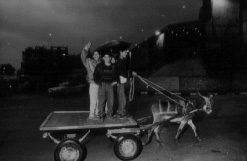

A Sense of Self
Even without a nation, Rashid Khalidi says, Palestinianshave national consciousness.

Standing tall: Children in Gaza celebrate
the night before the 1996 Palestinian elections.
No one denies the existence of thosepeople who call themselves Palestinians, but many deny the existence-past,present, or future-of a land called Palestine, and, therefore, the existenceof a Palestinian national "identity."
That identity exists, says historian Rashid Khalidi, andeven those who don't want to acknowledge it, do. As proof, he offers "thequintessential Palestinian experience," occurring at airports andother checkpoints: "It is at these borders and barriers," hewrites, "that the six million Palestinians are singled out for `specialtreatment,' and are forcefully reminded of their identity."
Issues of identity-who the Palestinians are, how theycame to call themselves Palestinians, and why they think of themselvesthe way they do-have been the focus of eight years of study for Khalidi,director of the U of C's Center for International Studies and a professorin history and Near Eastern languages & civilizations. In exploringthe problems these queries pose for historians, Khalidi, whose own heritageis Palestinian, Lebanese, and American, also wanted to answer the samequestions for general readers, especially those with a personal stake.
The result is Palestinian Identity: The Construction ofModern National Consciousness (Columbia University Press), a book thatbegins in the last decades of the 19th century with the advent of Palestiniannationalism and continues through the 1990s and the establishment of thePalestinian Authority. Khalidi, who spent three summers doing researchin Jerusalem on a Fulbright grant, argues that the early period throughthe aftermath of World War I was critical in the formation of Palestinianidentity.
Before the late 1800s, he writes, the region's peoplehad identified with their religions, their towns, the Ottoman Empire, and,linguistically, with other Arabs. "I had no idea of the extent towhich people had overlapping identities," he says. While those manyidentifications made forming a national consciousness difficult, the ideaof national identification was growing worldwide-and in the Middle Eastin particular.
"It is a fact that everybody remarks upon,"Khalidi says, "that 150 or 200 years ago, there were no Palestinians.Of course, there were no Israelis, there were no Egyptians, there wereno anything. The point is that all these nationalities, including Europeannationalities, didn't exist" until the rise of the nation-state, afact that, he argues, makes Palestinian identity no less valid than thatof any national identity.
At the end of the 19th century, Khalidi writes, an ideaof the boundaries of Palestine as a sacred place, if not a nation-state,was well established. That idea of a holy land, he notes, was shared byMuslims, Jews, and Christians, though their narratives about it contrasted.The idea of a Palestinian space was reinforced by administrative boundariesof the Ottoman Empire. Grounded in the importance of religion and a strongattachment to place, the emerging national identification took hold amongthe urban, educated population, and it grew-as it did in other countries-alongwith increased education, improved communications, and an expanding press.
The Palestinian press, Khalidi believes, was a significantforce in shaping national identity, particularly in its coverage of Zionism,the movement to establish the Jewish national state of Israel in Palestine."In the early decades of the 20th century," explains the historian,who sifted through years of Arabic newspapers, other primary documents,and his own family archives, "you would have people say, `Oh, youshouldn't panic, Zionism only is intended for the good of the people here,and we have no far-reaching objectives.'" But, he counters, "Theeducated Arab audience who'd been reading in their newspapers detailed,verbatim reports of debates in the first or second or third Zionist congress,would say, `These people are lying through their teeth.'"
While Khalidi refutes the view that Palestinian nationalismis "mainly or purely a response to Zionism," he acknowledgesthe impact that the "clash with Zionism" has had on shaping Palestiniannational consciousness. Indeed, he notes that early Zionist colonizationheightened Palestinian nationalism. During the first wave of colonizationfrom 1882 to 1903, many Jewish landowners continued to employ Palestinianpeasants as tenant-farmers. In the next wave during the early 1900s, however,more Jews immigrated and wanted to farm their own land, displacing thepeasants. The result was "enormous friction," including "clashesand deaths and fighting and shooting." Fear of losing their land hadalways been part of the Palestinian national identity. During World WarI, those fears came true when the Ottoman Empire collapsed. Great Britainthen occupied the country, issuing the Balfour Declaration of 1917, whichpromised to help Zionist leaders establish a Jewish national home in Palestine-makingit the only Arab state denied either self-rule or the promise of self-rule.
The next decades saw regular Palestinian uprisings againstthe British government and Jewish settlers. In 1947, intense fighting brokeout after the Arabs rejected the United Nations' plan to divide Palestineinto Jewish and Arab states. Palestine lost Jaffa and Haifa, its majoreconomic and cultural centers. The May 1948 creation of the nation-stateof Israel made way for the first Arab-Israeli war, with most of the Palestinianland lost to Israel, while Jordan and Egypt divided the rest. During 1947-49,about half of the region's Arab population fled, mainly to neighboringArab countries.
"The shared trauma reinforced their identity,"says Khalidi, but it also marked the beginning of a "hiatus in manifestationsof Palestinian identity" that lasted until the Palestine LiberationOrganization emerged in the 1960s. Yet the PLO, notes Khalidi, is not theprimary basis of Palestinian identity today: Many Palestinians questionits leadership and consider it a failure. For Khalidi, who advised thePalestinian delegation during the Israeli-Palestinian negotiations of 1991-93,the bright spot in the 1990s is that Palestinian national identity is beingrecognized by others, especially by the Israeli people. Established inthe 1993 Israel-PLO agreements, the Palestinian Authority-a governmentof sorts that is dominated by the PLO-has control over the Palestinianinhabitants of the Gaza Strip and most of the cities, towns, and villagesin the West Bank.
What remains to be seen, writes Khalidi, is whether the"very limited success" of those peace agreements "can beturned into the basis for building something lasting, something that will...finallyallow the achievement of self-determination, statehood, and national independencethe modern world has taught us is the `natural state' of people with anindependent national identity like the Palestinians."
Not long after the book's publication, Rashid Khalidisounds even less hopeful. He calls the Middle East peace process "gravely,gravely compromised" and predicts that "the agreements signedso far are not going to be implemented, and in some measure are unimplementable,"because of inherent flaws in the plans, the new Israeli leadership, and"the failure of the United States to play any kind of constructiverole." And so he intends to embark on a new project: an attempt toexplain the course, and the outcomes, of the Israeli-Palestinian negotiations.Whatever the result of those negotiations, he predicts, Palestinian identitywill continue to evolve. --Kimberly Sweet
Also in Investigations:
- Citations: ChicagoResearch in Brief
- INVESTIGATIONS
- CHICAGO JOURNAL
- LETTERS
- CHICAGOPHILE
- Feature story: "Clean-uphitter"
- Feature story: "Wavingthe Chicago flag"
- Feature story: "Betweentwo Worlds"
- Feature story: "Bloomin review"
- CLASS NEWS, includingALUMNI AWARDS
- DEATHS
- BOOKS BY ALUMNI
- IN THE CLUBS
Go to:
Return to August 1997 Tableof Contents